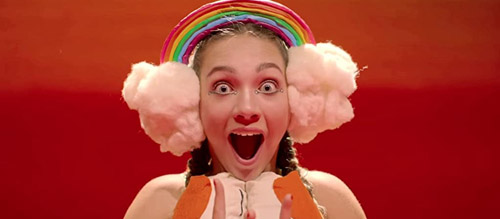Sia’s Music Is Not “a Love Letter to the Autistic Community”: It’s Another Unrealistic Portrayal of ASD
This article was written exclusively for The Film Magazine by Shona Leigh Pope.
Representing autism in cinema has always presented challenges for filmmakers.
In 1988, the Oscar-winning Rain Man wasn’t just the most widely-accepted representation of autism on film; it was the only frame of reference regarding those on the autistic spectrum.
While this may have aided in making those with ASD more visible in society, it led to assumptions that all those on the spectrum possessed some sort of remarkable skill or ability.
Autistic Savants are children or adults on the autistic spectrum who demonstrate particular abilities that far exceed most peoples. In Rain Man, Dustin Hoffman is cast as Raymond, an autistic savant. Raymond possesses an eidetic memory and displays extraordinary mathematical skills.
Rain Man contributed to the widespread belief that those on the autism spectrum were born child prodigies lacking social skills, despite being estimated that fewer than a hundred autistic savants are alive today.
Thirty-three years later, and an accurate portrayal of autism in cinema is still not entirely within grasp, the latest controversy being Australian singer/songwriter Sia’s directorial debut, Music, released in Australia on January 14, 2021, by StudioCanal.
Public Criticism
Music follows Zu (Kate Hudson), a newly sober drug-dealer who finds herself in sole guardianship of her autistic younger sister Music (played by Maddie Ziegler) following their grandmother’s death.
The film features musical interludes depicting Music’s perspective of the world: oversimplified shapes swathed in bright colours and textures to carry the musical numbers performed by Sia herself.
Despite two Golden Globe nominations, Music isn’t without its criticisms.
The film received generally unfavourable reviews, one review in The New York Times even going so far as to declare Music “indistinguishable from mockery.”
Negative attention for the film wasn’t just limited to official reviews. The film attracted a fair amount of criticism from the autistic community, to the extent of a petition on change.org calling for the Golden Globe nominations for the film to be rescinded. It was a petition that received over 65,000 signatures.
The controversy began several months before the film’s release when Sia received criticism for her casting choices. Music herself was played by Maddie Ziegler, a neurotypical person and frequent collaborator of Sia’s.
Critics argued that Sia should have cast an actor with experience of autism. Sia responded to this backlash by suggesting that she had tried to work with an actor with ASD; however, they had “found it unpleasant and stressful.”
Her response only added fuel to the fire when Jane Harris (speaking for National Autistic Society) said that they “were concerned by the suggestion that an autistic person wouldn’t be able to cope in the role of the autistic lead character.”
Where Did Music Go Wrong?
Neither Sia nor Ziegler are on the autistic spectrum. To prepare for the role, Ziegler spent some time at the Child MIND institute to learn more about the behaviours and characteristics that come with ASD.
But the issue here is not Ziegler’s performance, as she appears to have a decent grasp of autistic communication and stimming (self-stimulation in the form of repetitive body movements).
There are two pressing issues in Sia’s production (and most productions that prominently feature autism in the narrative) that need to be addressed…
The first issue is the romanticisation of non-neurotypical behaviour, and the second is Music’s lack of humanisation.
Instead of seeing a fully-fleshed-out human being, we are presented with a prop used to present physical challenges and emotionally assist the neurotypical characters who need to care for them.
The challenges faced by those with autism are scarcely acknowledged. Instead, filmmakers often opt to highlight savant behaviours or focus on how those with ASD “see the world differently to everyone else.” This typically results in the character with autism having very little agency in the narrative.
Autistic people do not see the world through rose-tinted glasses, nor do they all come pre-packaged with inhuman abilities that neurotypical people do not possess. They are living, breathing humans who are presented with different challenges in life compared to most people, a fact that plenty of filmmakers have neglected whilst constructing their autism-centric narratives.
Making Autism Understood
The core-issue with autism representation in film can be summarised in a quote by Sia herself.
“The movie is both a love letter to caregivers and to the autism community. I have my own unique view of the community.“
Autism is far too commonly represented by neurotypical creators who believe they have a firm understanding of the autistic community. It’s time to let more autistic creators step up in the world of filmmaking.
Representing autism in film is no longer simply about making autism visible; representing autism in film needs to be about making autism understood. This is something that is not achievable if filmmakers continue to neglect the need to include more autistic creatives in the filmmaking process.
Music is not the first award-nominated film to completely neglect appropriate representation of autism. Still, its presence as a major release with A-List celebrity backing and awards recognition should be of concern.
While Rain Man is no longer the only frame of reference for those on the ASD spectrum thirty-three years after its release, Music proves that the autistic community has unfortunately not found any better representation.
Written by Shona Leigh Pope
You can support Shona at the following links:
Twitter – @ShonaLeighPope



